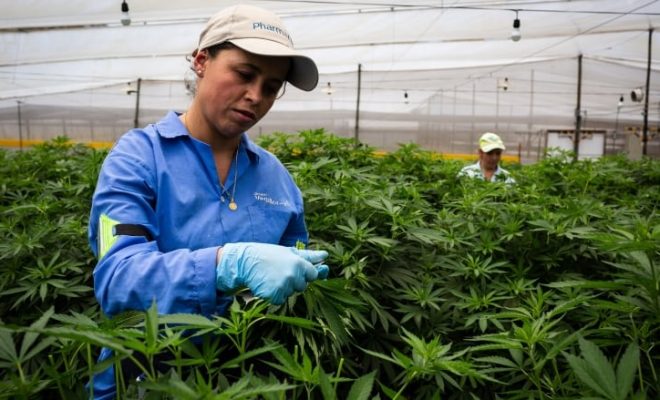How PharmaCielo and Anthony Wile Are Leading Colombia’s Medical Cannabis Revolution

Canadian company PharmaCielo is playing a leading role in helping Colombia, a country once known for violent drug trafficking, evolve as one of the world’s largest producers of legal medical cannabis.
It’s been two years since Colombia legalized medical cannabis for domestic use and export, and it’s estimated that the nation will account for a fifth of a global market that could grow to $40 billion a year. To date, the government has only authorized production for scientific research, not commercial production. It has issued 33 licenses and anticipates growing some 40.5 tons of medical marijuana a year.
Colombia’s first license was issued to PharmaCielo, which today is growing a portion of its legal crop from a 27 hectare plantation property in Rionegro, near the northeastern city of Medellin. Today, the rows of cannabis bushes on the site represent part of what will be a 40 million CAD investment by PharmaCielo in the future of medical marijuana, as well as in the future of Colombia.
For PharmaCielo’s Chief Executive, Colombian-Canadian Anthony Wile, it’s a labor of love from every aspect. It’s good business, for starters, as the market for medical marijuana in Canada explodes to reach an estimated 2.35 billion CAD by 2025.
More than that, Anthony Wile says, Colombia deserves the profits from crops that have been associated with so much historic damage. “The nation has an opportunity to see the benefits derived from this plant through scientific research and to be on the right side of the current trend,” he adds.
As part of the company’s commitment to the community, PharmaCielo sources 10 percent of its site’s production from indigenous peoples of the region. “We need to serve not only our own interests, but those of the people who live and work here,” says Wile.
PharmaCielo’s investment in Colombian-grown medical cannabis is not just for cultivation of the plants and production of oils. The Rionegro site is also where PharmaCielo conducts genetic research to ensure the quality and efficacy of its medicinals.
Canada has long been at the forefront of the medical cannabis industry, legalizing its use in 2001. More recently, recreational marijuana was legalized, effective Oct. 17. (It is only the second nation to do so, after Uruguay.)
As marijuana has become more accepted and mainstreamed over the years, Canada has seen a huge growth in the number of registered medicinal marijuana users – from 24,000 in June of 2015 to 200,000 two years later.
PharmaCielo intends to capitalize on that trend with top quality medicinals, hoping to reach commercial production by the beginning of 2019. It is hoping the Colombian government’s final approval of domestic distribution through official channels is confirmed by then.
The company is currently registering strains with the Colombian Agricultural Institute, the licensing agency, confirming not only the therapeutic effects of their varieties of marijuana, but that it will be kept away from recreational users.
Wile points out that Canada provides an example of how the medicinal cannabis industry can be regulated and supervised, as it continues to modify rules to optimize the sector’s performance. “We’ve had conversations with Colombian government officials, as we think perhaps they can learn from Canada’s experience,” he says. “The regulations have been set, but some modifications may help it see exponential growth.”
PharmaCielo is in the process of going public with a listing on the Toronto Stock Exchange. Wile hopes that will provide a boost in investment funding that will further solidify its positioning as the dominant player in a fast-growing market.







